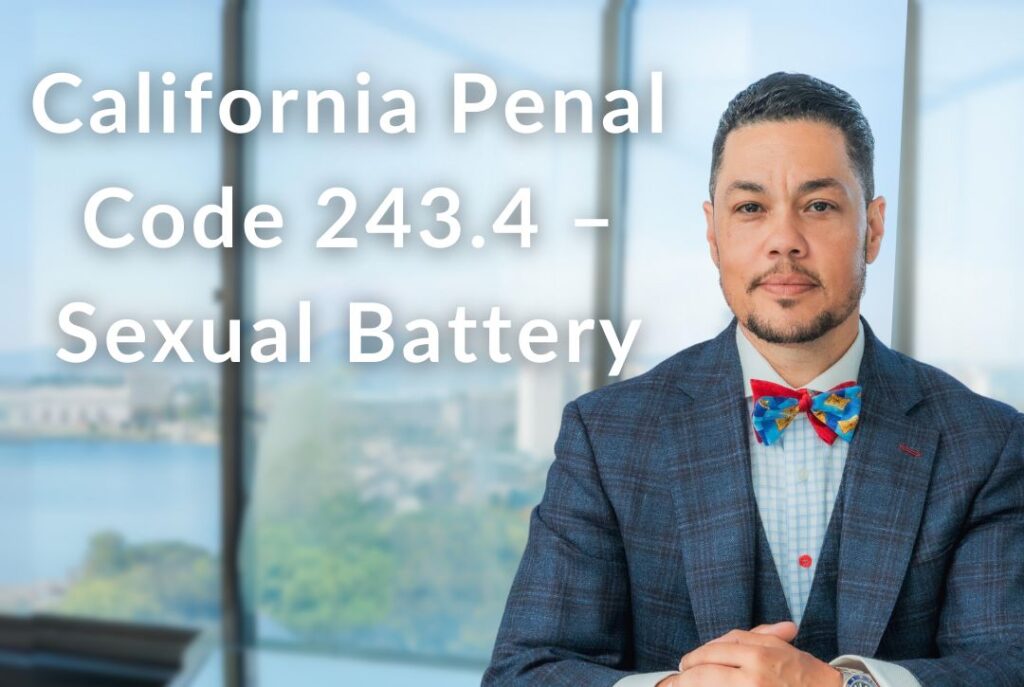California Penal Code 243.4 – Sexual Battery
California Penal Code 243.4 – Sexual Battery
California Penal Code 243.4 defines sexual battery as the unwanted touching of someone’s intimate parts for sexual arousal or abuse. This offense can be charged as either a misdemeanor or a felony, depending on the circumstances.
A conviction may result in jail time, fines, and mandatory sex offender registration. This article explains what constitutes sexual battery, the penalties involved, and potential legal defenses.
Sexual Battery Laws in California – Penal Code 243.4 PC
California’s Penal Code 243.4 PC addresses sexual battery, which involves non-consensual contact with another person’s intimate areas for sexual arousal, gratification, or abuse. Known as a “wobbler” offense, sexual battery charges can be filed as either misdemeanors or felonies, depending on the circumstances.
What is Sexual Battery?
Sexual battery occurs when someone touches another person’s intimate parts without consent, with intent for sexual arousal, gratification, or abuse. Under PC 243.4, intimate parts include:
- Groin
- Buttocks
- Breasts
- Anus
- Other private areas
Even touching through clothing can qualify if the contact is intended to be sexual.
Defining Sexual Battery Under PC 243.4(a)
PC 243.4(a) applies to cases where the victim is unlawfully restrained during the act. This section intensifies the charge if the victim’s freedom is restricted or controlled, potentially leading to harsher penalties. Prosecutors need to prove:
- The victim was intentionally restrained
- The act occurred with the intent of sexual arousal or abuse
Sexual Battery PC and Related Legal Terms
The term “sexual battery” is often associated with “sexual assault,” but in California, sexual battery specifically involves non-penetrative, unwanted touching. Key terms include:
- Unlawful Restraint: Controlling someone’s freedom of movement during the act
- Intimate Parts: Specific areas considered private by law
Understanding these terms helps clarify the crime’s legal thresholds.
Wobbler Forms of PC 243.4 Sexual Battery
Sexual battery under PC 243.4 is a “wobbler,” meaning it can be charged as a misdemeanor or felony based on the situation’s severity. Prosecutors assess factors such as:
- Victim’s Vulnerability: Age, physical or mental state
- Defendant’s Criminal Record: Prior convictions or repeat offenses
This flexibility allows charges to be tailored to match the circumstances, influencing potential sentencing outcomes.
Penalties for Sexual Battery Under PC 243.4
Penalties for sexual battery under PC 243.4 depend on whether the charge is a misdemeanor or felony:
- Misdemeanor Penalties:
- Up to 1 year in county jail
- Fine up to $3,000
- Felony Penalties:
- Up to 4 years in state prison
- Fine up to $10,000
- Potential registration as a sex offender
Repeat offenders or cases with aggravating factors face enhanced penalties.
Request a Free Consultation
Defending Charges of PC 243.4 Sexual Battery
Facing a charge under PC 243.4 requires a strong defense strategy, often focusing on consent, lack of intent, or unreliable evidence.
Common Defenses Against Sexual Battery Charges
There are several defenses available in sexual battery cases, including:
- Consent: Demonstrating mutual agreement can invalidate claims of non-consensual contact
- Lack of Intent: Proving the touch was non-sexual can challenge the charge
- Mistaken Identity: Identifying evidence that points to someone else can create reasonable doubt
These defenses target weaknesses in the prosecution’s case.
Challenging Evidence in Sexual Battery Cases
In sexual battery cases, evidence challenges can be crucial. Defense attorneys often question:
- Witness Reliability: Contradicting witness statements can create doubt
- Improper Evidence Collection: Evidence obtained unlawfully or unethically may be excluded
Challenging evidence is essential for creating reasonable doubt in a jury.
Effective Legal Strategies for California Sex Crime Cases
Effective legal strategies for defending against sexual battery may include:
- Negotiating Lesser Charges: Working to reduce charges when possible
- Filing Motions to Dismiss: When evidence is insufficient or unlawfully obtained
- Expungement: Pursuing record clearance for eligible cases
Additional Consequences
Conviction under California Penal Code 243.4 for sexual battery carries significant legal and personal consequences. Beyond immediate penalties, these additional outcomes can impact your future and require careful legal guidance.
Registration as a Sex Offender
If convicted of sexual battery, you may be required to register as a sex offender in California. This registration is often mandatory for felony convictions and involves updating your status annually or whenever you change your address.
Sex offender registration places serious restrictions on where you live, work, and who you interact with, and it is public information in many jurisdictions.
Long-Term Consequences of a Sexual Battery Conviction
A sexual battery conviction can lead to enduring consequences that go beyond immediate legal penalties. These may include:
- Difficulty Finding Employment: Employers often conduct background checks, and a sex crime conviction can limit job opportunities.
- Housing Restrictions: Certain residential areas, especially near schools or parks, may restrict where convicted sex offenders can live.
- Loss of Civil Rights: Felony convictions can affect your rights, including limitations on voting or gun ownership.
These long-term effects underscore the importance of a strong legal defense to minimize the impact on your life.
Expungement Options for PC 243.4 Convictions
Expungement provides an opportunity to clear your record after a sexual battery conviction, but eligibility depends on several factors. Typically, you must have completed your sentence, including probation, and met all court-ordered requirements.
While expungement doesn’t erase the conviction entirely, it can significantly improve your ability to secure employment and housing by reducing the visibility of your record.

As Seen On












FAQ
Is an unwanted kiss battery?
Yes, an unwanted kiss can be considered battery if it involves non-consensual physical contact, especially if there is intent to satisfy personal desires without consent.
How do you get over SA?
Recovering from sexual assault often involves professional therapy, support from friends and family, and, sometimes, joining support groups. Seeking immediate help from a therapist can be essential for healing.
How to respond to a sexual assault?
If you’re a victim of sexual assault, seek immediate medical and emotional support, report the incident if you feel safe doing so, and consult a counselor for ongoing support.
Is touching without consent a battery?
Yes, touching without consent can constitute battery under California law if it is intentional and involves physical contact meant to offend or harm the other person.
Can there be battery without assault?
Yes, battery can occur without assault, as battery requires physical contact, while assault does not; assault refers to an attempted or threatened action.
Get Trusted Legal Guidance for Your Defense
Facing a sexual battery charge can be overwhelming, but you don’t have to face it alone. At Huff Legal, we specialize in providing compassionate, experienced representation tailored to your unique needs. Our team will work tirelessly to explore all options, build a strong defense, and protect your rights.
Contact Huff Legal today for a confidential consultation and take the first step toward securing the support you deserve.
What Clients Say About Us





Schedule Your Free Consultation Today
LET HUFF HELP YOU
As a former police officer and patrol supervisor and his time spent as a United States District Court Judicial Law Clerk to the Chief Judge, Attorney Huff knows how to navigate all levels of the complex criminal law system. We also have more than 55 years of combined experience dealing with various complex criminal legal matters and have helped just over 1,500 clients over the past few years.
Why Huff Is Your Best Option For Criminal Defense
55+ Years of Combined Experience
At Huff Legal, we have more than 55 years of combined experience dealing with complex criminal legal matters, which can oftentimes be quite challenging. In order to get the outcome you deserve, you need a team of experienced attorneys on your side, who can help you navigate the legal system, so you can move past this situation and focus on the life ahead of you!
5 Star Rating on Google
We have a proven track record of success and are dedicated to our clients’ best interests. If you’re looking for a law firm that will always have your back, look no further than Huff Legal. Just have a look at some of our amazing client reviews over here!
1,500+ Happy Clients
Over the years, we’ve had the privilege of helping over 1,500 clients with their legal needs. When you work with us, you can be confident that you’re getting the best possible legal representation. We’re proud of our track record and our reputation for being a firm that delivers great results.
What Our Clients Say About Us


Sheila


Abel Resendiz


Manuela Frazier


Doris
Contact Huff Today
Request A Free Consultation
* Free consultations only available for Criminal Defense


In legal terms, an accessory to murder refers to an individual who aids, abets, or otherwise assists in committing a murder. While the specifics may vary across jurisdictions, California law treats accessories to murder as active participants in the crime, holding them accountable for their actions. In San Francisco Bay Area, there are two primary types of accessories to murder:
In the event that you find yourself in the Bay Area facing accessory to murder charges, you should first call a criminal defense attorney who can help you defend your rights and lessen the effects of the investigation. Contact an attorney at Huff Legal as soon as possible following your arrest. An accomplished attorney from Huff Legal will thoroughly examine your case, who will then develop a strategy and build a defense.
